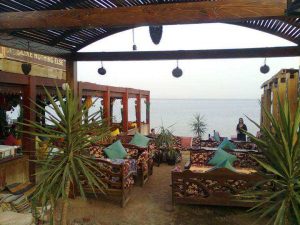 Despite their protests, Nubians near Aswan fear that development projects will eventually dispossess them of their land.
Despite their protests, Nubians near Aswan fear that development projects will eventually dispossess them of their land.
Long before the recent string of North African riots – in Tunisia and most recently Egypt – the Nubian community south of Aswan on the River Nile have resisted projects they say threaten a way of life depicted in this Gharb Soheil art show.
Despite being able to halt one project, the community is powerless against a relationship between a Nubian businessman and the Aswan governorate, who have planned several developments, including a mall, that are bound to exacerbate the region’s environment.
When in 2009 the businessman Mansour Amer attempted to build “Porto Aswan” near the Aga Khan tomb, the local community solicited help from singer Mohamed Mounir, who in turn petitioned the Supreme Council of Antiquities to intervene.
Based on its proximity to the tomb, the project never came to fruition.
Soon thereafter, locals came across few workers (sounds like a similar case in Israel, where Israel Energy Initiatives started digging on the sly) and discovered that Ali Agha, formerly from the area, had bypassed due process and appealed directly to the governorate for permission to build the “Khan Aswan” project.
Given that Nubian tribal customs determine land ownership, and that very few people actually “own” their own land, the community felt betrayed by the authorities who overlooked their customs in favor of development.
Ali Agha told Al-Masry Al-Youm that he had Nubian interests at heart, and that he intends to not only build a prototype Nubian village, but also that he will only employ Nubians.
Meanwhile, the governor’s spokesman Mohamed Hassan told the paper that the region needs development and investment, and that the mall – complete with 150 outlets and restaurants – along with four new hotels will create 14,000 jobs.
Asked whether the governorate was concerned about the development plan’s impact on the local environment, he claimed that the bigger the project, the more resources available to ensure environmental protection.
Meanwhile, the Nubian culture is certain to enter into extinction. This is what the Gamal Ahmed Salahin, a local chieftain, told Hoda Baraka from Al-Masry Al-Youm:
We have always considered this area to be a natural protectorate; we dont want to see it ruined with the construction of touristic projects bound to attract more investors to follow suit.
Other residents worry that expansion will eventually dispossess them of their own land. The Noba nomads, after which Nubia is named, settled the Southern Egypt/Sudan region in the 4th century.
More on the Nile and Aswan:
Barge Sinks in the Nile, Releasing 110 Tonnes of Diesel
Nile Awareness Mission: Aswan to Alexandria In A Kayak
Art and Spirituality: The Antidote to Bigger, Better, More



